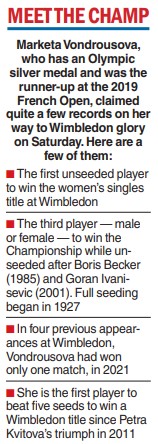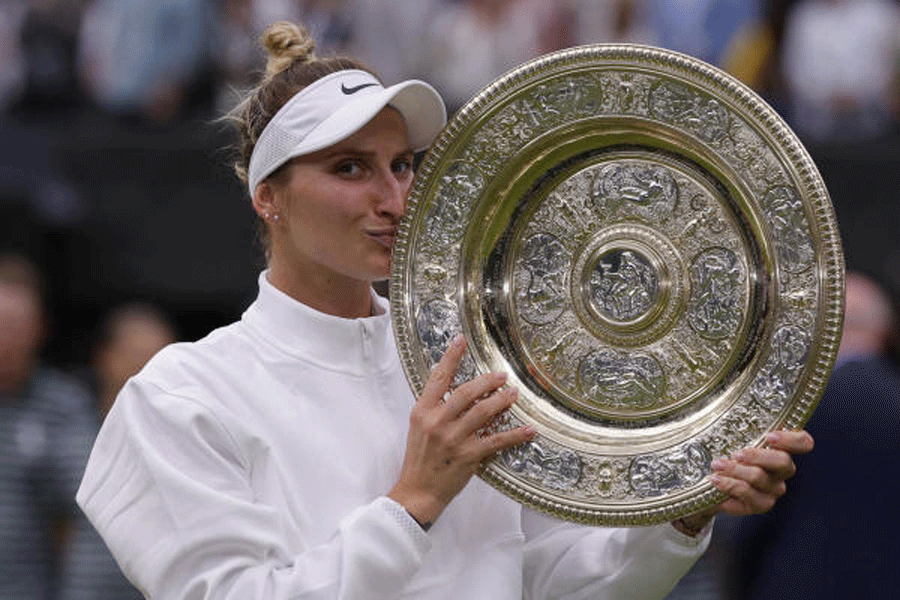Marketa Vondrousova of the Czech Republic became one of the most unlikely Wimbledon champions on Saturday, beating Ons Jabeur, a trailblazing Tunisian, in straight sets.
Vondrousova, 24, became the first unseeded women’s player to win Wimbledon and the latest in a long line of Czech-born women to lift the most important trophy in the sport, going back to Martina Navratilova’s domination of the tournament in the 1980s, after Navratilova had defected to the United States.
Like Navratilova, who was watching from a box, Vondrousova is a left-handed player with a nasty slice serve that she used throughout the afternoon in the tensest moments when Jabeur tried to take control of the match or mount yet another comeback.
The similarities with Navratilova, an aggressive serve-and-volleyer who burst into the sport as a teenager, mostly end there.
Vondrousova, who won 6-4, 6-4 in an error-filled match that made up for what it lacked in quality with surprise, is the ultimate under-the-radar player who is now three-for-three when it comes to crushing tennis fairy tales. She beat Naomi Osaka at the Tokyo Olympics in 2021, just days after Osaka lit the Olympic flame and was a favourite to win a gold medal on home soil.
On Thursday, Vondrousova beat Elina Svitolina, a new mother from Ukraine who mounted a spirited run to the semi-finals.
On Saturday afternoon, it was Jabeur’s turn to have Vondrousova’s tricky and unorthodox game crush her dream.
“I don’t know what is happening,” Vondrousova said on the court at the end of the match.
She had plenty of company asking that question, considering she had a cast on her wrist following surgery during Wimbledon last year. This time, her husband opted not to come watch her play here until Saturday, choosing instead to stay home and take care of their hairless Sphynx cat.
After Vondrousova beat Svitolina though, Stepan Simek scrambled to find a cat-sitter and caught a flight to watch his wife play in the final. On Sunday, they planned to celebrate their first anniversary.
For Jabeur, the loss in a second straight Wimbledon final against an opponent who had accomplished far less than other women she beat on the way to the precipice of tennis history was nothing less than heartbreaking. Jabeur has now lost three of the last five grand slam finals, falling just short of becoming the first woman of Arab descent and from Africa to win the most important championships in tennis.
Vondrousova finally ended Jabeur’s nightmarish afternoon with a running backhand volley into the open court. As the ball bounced twice far out of her reach, Jabeur, known as the “Minister of Happiness” for her almost always bright demeanour, whom tennis fans everywhere, especially at the All England Club, have embraced, pulled her bandanna from her head and began her slow, sad and increasingly familiar trudge to the net.
Vondrousova was a little late in getting there. She had collapsed on the grass at the end of the final point. She rose to hug Jabeur and soon was back in the middle of the court, kneeling, and trying to figure out how she had pulled off this improbable run. Jabeur sat in her chair and wiped away tears.
For Vondrousova and Czech tennis, the celebrations were just beginning. The Czech Republic, with a population of roughly 10.5 million people, has become a women’s tennis factory unlike anything that exists in the sport. There are eight Czech women in the top 50, most of them, like Vondrousova, in their mid-twenties and younger.
Before Saturday, Vondrousova was best known for the body art on her arms, and had made a bet with her coach, Jan Mertl, a former Czech player, that if she won a grand slam he would get a tattoo to commemorate the triumph.
Holding her winner’s platter, Vondrousova said they would be heading to the tattoo parlour on Sunday.
NYTNS












